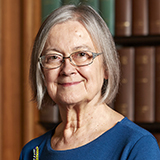Lady Hale pays tribute to late colleague Lord Kerr in Belfast speech

Lady Hale
The late Lord Kerr of Tonaghmore “embodied” the case for always having a judge from Northern Ireland on the Supreme Court bench, Lady Hale has said.
The former Supreme Court president reflected on the importance of the court having judges from all parts of the United Kingdom as she addressed a virtual event yesterday afternoon, our sister publication Irish Legal News reports.
Having reviewed all the UKSC cases involving Northern Ireland, Lady Hale said it was an English case where she and Lord Kerr dissented that provided an “example of the clear thinking that a justice from Northern Ireland can bring”.
She pointed to R (A and B) v Secretary of State for Health [2017] UKSC 41, in which a woman living in Northern Ireland challenged the NHS’s refusal to cover the cost of her teenage daughter having an abortion in England.
The UKSC dismissed the case by 3-2, with the lead judgment describing the lack of access as consequences of a “democratic decision of the people of Northern Ireland”, while Lord Kerr and Lady Hale issued dissenting judgments.
Lady Hale said her late colleague from Northern Ireland had brought insight when he pointed out, in his dissenting judgment, that the Northern Ireland Assembly “had said nothing against allowing women to travel to Great Britain for an abortion”.
“It is also a good example of dissent sometimes winning the day,” she said. “Such was the outrage at the decision that the Scottish government announced it would provide NHS abortions for women from Northern Ireland and the UK government eventually bowed to pressure to do the same.”
The following year, Lady Hale and Lord Kerr were both in the minority in Re an application by the NIHRC for Judicial Review (NI) [2018] UKSC 27, where the court held that the Northern Ireland Human Rights Commission (NIHRC) did not have standing to bring a challenge to Northern Ireland’s ban on abortion.
“We had a clear majority in favour of incompatibility but we couldn’t make a formal declaration of incompatibility because we also had a majority of 4-3 holding that the NIHRC did not have standing to bring the proceedings, because there had to be an actual or potential victim of an unlawful act to which the proceedings related,” she said.
She added: “One has to admire the intellectual honesty of Lord Mance, convinced of the incompatibility but equally convinced of the lack of standing.”
Lady Hale said the dissenters were again ultimately vindicated, as the Northern Ireland Act 1998 was later amended to remove the crucial obstacle for such challenges “by the unlikely instrument of the European Union (Withdrawal Agreement) Act 2020”.
Elsewhere in her wide-ranging speech for the Belfast Solicitors’ Association (BSA), Lady Hale spoke about the Siobhan McLaughlin case on widowed payments’ allowance – heard during “the very enjoyable week in 2018 when we sat in the Bar Library in Belfast” – and the “famous gay cake case”, otherwise known as the Ashers case.
She also discussed the large volume of legacy-related cases that have come through the courts, including the murder of Pat Finucane, and paid tribute to the work of Dame Siobhan Keegan in overseeing legacy cases in Northern Ireland – displaying “all the qualities which would make her a great Lady Chief Justice”.
Lady Hale noted that Lord Justice Stephens, who was appointed to fill the vacancy created on the UKSC by Lord Kerr’s retirement, had become the first Northern Ireland judge to serve either as a law lord or Supreme Court justice without having first served as Lord Chief Justice of Northern Ireland.
“But he did have the distinction of having been one of my students at the University of Manchester many years ago, so I’m very proud of him,” she said.
Considering the case for the court having judges from all parts of the UK, she said: “Lord Kerr embodied that case. I wish Lord Stephens well in filling his shoes, but it will be difficult.”
Asked in a short Q&A session about the continuing legal uncertainty around the Northern Ireland Protocol, Lady Hale said the case law on how to resolve conflict between two constitutional statutes “has not yet been decided”.
However, she said she was certain that someone had the “ingenuity to devise litigation which will produce such a case”.









